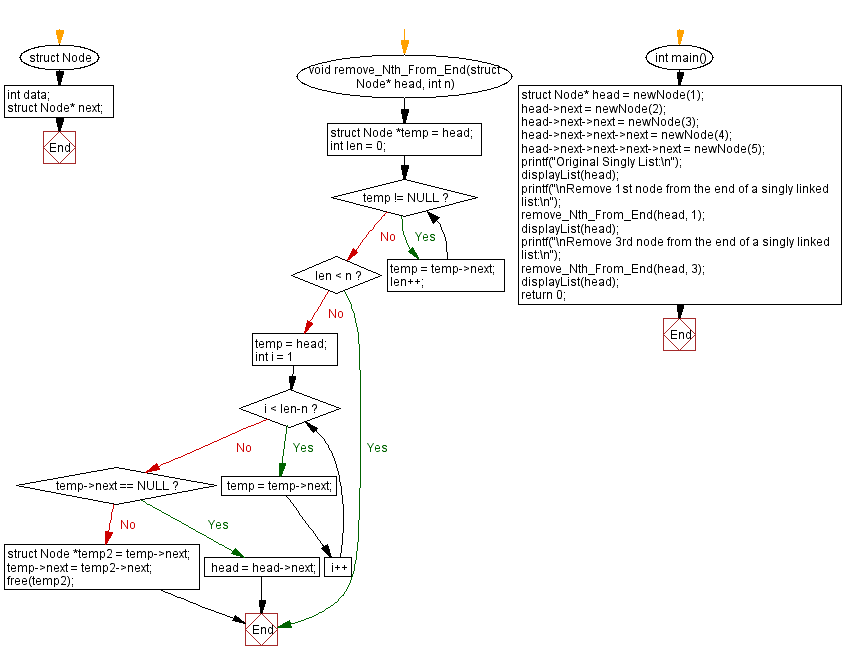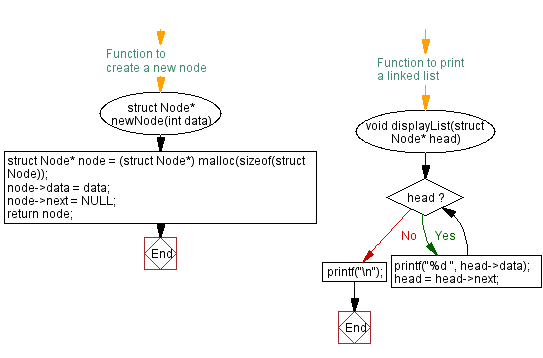C Exercises: Remove Nth node from the end of a singly linked list
28. Nth Node Removal Variants
Write a C program to remove the Nth node from the end of a singly linked list.
Sample Solution:
C Code:
#include<stdio.h>
#include <stdlib.h>
// Structure for defining a Node in a Singly Linked List
struct Node {
int data; // Data stored in the node
struct Node* next; // Pointer to the next node
};
// Function to create a new node in the Singly Linked List
struct Node* newNode(int data) {
struct Node* node = (struct Node*) malloc(sizeof(struct Node)); // Allocate memory for a new node
node->data = data; // Assign the data to the new node
node->next = NULL; // Initialize next pointer as NULL
return node; // Return the new node
}
// Function to remove the nth node from the end of a Singly Linked List
void remove_Nth_From_End(struct Node* head, int n) {
struct Node *temp = head; // Initialize a temporary pointer to the head of the list
int len = 0; // Variable to store the length of the list
// Calculate the length of the linked list
while (temp != NULL) {
temp = temp->next;
len++;
}
// Check if the given position to remove is valid
if (len < n) {
return; // If position is invalid (beyond list length), exit the function
}
temp = head; // Reset the temporary pointer to the head of the list
// Traverse to the node just before the node to be removed
for (int i = 1; i < len - n; i++) {
temp = temp->next;
}
// Check if the node to be removed is the first node
if (temp->next == NULL) {
head = head->next; // Update head to the next node
return;
}
struct Node *temp2 = temp->next; // Store the node to be removed in temp2
temp->next = temp2->next; // Adjust pointers to remove the node
free(temp2); // Free memory occupied by the removed node
}
// Function to print a linked list
void displayList(struct Node* head) {
while (head) {
printf("%d ", head->data); // Print the data of the current node
head = head->next; // Move to the next node
}
printf("\n");
}
// Main function
int main() {
struct Node* head = newNode(1); // Create a Singly Linked List with nodes containing data
head->next = newNode(2);
head->next->next = newNode(3);
head->next->next->next = newNode(4);
head->next->next->next->next = newNode(5);
printf("Original Singly List:\n");
displayList(head); // Print the original list
printf("\nRemove 1st node from the end of a singly linked list:\n");
remove_Nth_From_End(head, 1); // Remove the 1st node from the end
displayList(head); // Print the updated list
printf("\nRemove 3rd node from the end of a singly linked list:\n");
remove_Nth_From_End(head, 3); // Remove the 3rd node from the end
displayList(head); // Print the updated list
return 0;
}
Sample Output:
Original Singly List: 1 2 3 4 5 Remove 1st node from the end of a singly linked list: 1 2 3 4 Remove 3rd node from the end of a singly linked list: 1 3 4
Flowchart :


For more Practice: Solve these Related Problems:
- Write a C program to remove the middle node of a singly linked list using the slow and fast pointer technique.
- Write a C program to remove the nth node from the beginning if n is a prime number, with appropriate error handling.
- Write a C program to remove the nth node from the end recursively without using iterative loops.
- Write a C program to remove the nth node from the end in one pass using two pointers and validate the index.
Go to:
PREV : Binary Tree via Linked List.
NEXT : Merging K Sorted Lists Challenges.
C Programming Code Editor:
Have another way to solve this solution? Contribute your code (and comments) through Disqus.
What is the difficulty level of this exercise?
